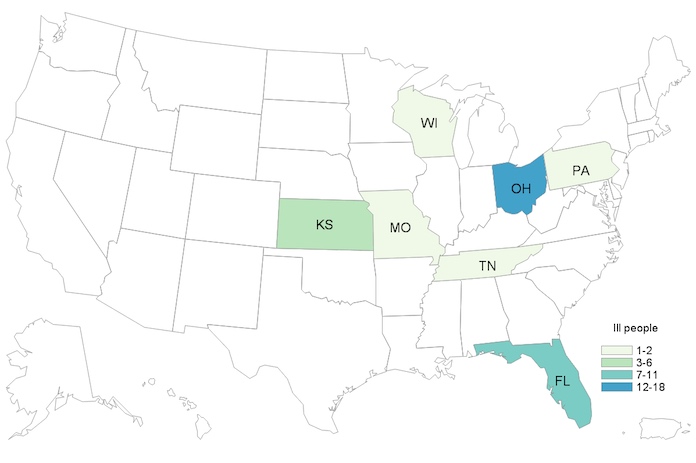A multistate Campylobacter outbreak is linked to puppies purchased from Petland stores. Thirty nine people in seven states have been sickened in this outbreak.

The Ohio Department of Health, the CDC, several other states, and the USDA Animal and Plant Health Inspection Service are investigating the outbreak. Petland is a national pet store chain.
The case count by state is: Florida (11), Kansas (5), Missouri (1), Ohio (18), Pennsylvania (2), Tennessee (1), and Wisconsin (1). Illnesses began on dates ranging from September 15, 2017 through August 12, 2017. The most recent illness was reported on September 1, 2017. Ill persons range in age from less than 1 year to 64 with a median age of 22. Twenty eight patients are female. Nine, or 23%, have been hospitalized. No deaths have been reported.
The 39 people with lab-confirmed Campylobacter infections, or symptoms consistent with a Campylobacter infection, were exposed to puppies sold through these stores. Twelve of those sickened are Petland employees in four states. Twenty-seven patients either recently purchased a puppy at Petland, visited a Petland, or visited or live in a home with a puppy sold through Petland.
Petland is cooperating with public health and animal health officials. Campylobacter can be spread through dog feces.
Whole genome sequencing found that samples of Campylobacter isolated from the stool of puppies sold in a Petland store in Florida were closely related to Campylobacter isolates from samples from an ill person in Ohio.
The symptoms of a Campylobacter infection include abdominal cramps and pain, nausea and vomiting, fever, lethargy, and diarrhea that is often bloody. Most people are sick for 2 to 10 days.
This infection should be taken seriously, since a small percentage of patients can develop Guillain-Barre Syndrome (GBS), which is a serious complication that can cause paralysis. Others can experience joint pain and swelling after the infection. A Campylobacter infection can also lead to meningitis.
People who are more likely to have a serious infection or suffer complications include children under the age of 5, the elderly, pregnant women, and anyone with a chronic illness or weakened immune system.
To help prevent this infection, which many dogs can carry, choose a puppy who is bright, alert, and playful. They should have shiny, soft fur that is free of feces. Take the puppy to a vet for a checkup within a few days after adoption.
Dogs can carry this bacteria and not show any symptoms. But when the animal is sick, they will be sluggish, have diarrhea, show abnormal breathing, and will lose their appetite. If your puppy is diagnosed with this illness, inform the pet store or breeder about his health. Thoroughly clean the area where your puppy plays, eats, and sleeps. If your puppy dies, wait a few weeks before getting another pet to reduce the chance that dog will get sick.
Always wash your hands well with soap and water for at least 20 seconds when you touch dogs, their food, or clean up after them. Children should have their hand washing supervised. Promptly pick up and dispose dog poop. And clean up pee, poop, and vomit in the house immediately.
The noted law firm Pritzker Hageman helps people sickened in bacterial outbreaks protect their legal rights and get answers and compensation. Our lawyers help patients and families of children in personal injury and wrongful death lawsuits against retailers, grocery stores, food processors, restaurants, and others. Attorney Fred Pritzker recently won $7.5 million for a young client whose kidneys failed because he developed hemolytic uremic syndrome after an E. coli infection. You should know that class action lawsuits may not be appropriate for outbreak victims because each individual case is so different and unique.




